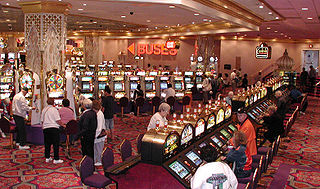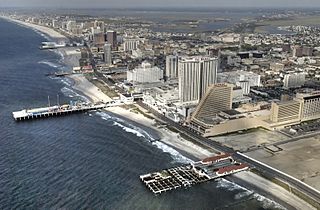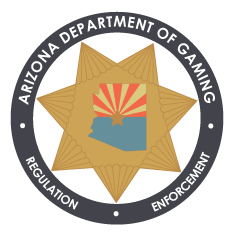Related Research Articles
The Grand Victoria Casino Elgin is a riverboat casino in Elgin, Illinois, United States, located about 40 mi (64 km) west of Chicago. It is owned and operated by Caesars Entertainment.
Online gambling is any kind of gambling conducted on the internet. This includes virtual poker, casinos and sports betting. The first online gambling venue opened to the general public, was ticketing for the Liechtenstein International Lottery in October 1994. Today the market is worth around $40 billion globally each year, according to various estimates.

The Texas Alcoholic Beverage Commission, or TABC, is a Texas public agency responsible for regulating, inspecting, and taxing the production, sale, and use of alcoholic beverages within the state. The agency was established in 1935 and is headquartered in Austin.
Gambling in the United Kingdom is regulated by the Gambling Commission on behalf of the government's Department for Digital, Culture, Media and Sport (DCMS) under the Gambling Act 2005. This Act of Parliament significantly updated the UK's gambling laws, including the introduction of a new structure of protections for children and vulnerable adults, as well as bringing the burgeoning Internet gaming sector within British regulation for the first time.

The Indian Gaming Regulatory Act is a 1988 United States federal law that establishes the jurisdictional framework that governs Indian gaming. There was no federal gaming structure before this act. The stated purposes of the act include providing a legislative basis for the operation/regulation of Indian gaming, protecting gaming as a means of generating revenue for the tribes, encouraging economic development of these tribes, and protecting the enterprises from negative influences. The law established the National Indian Gaming Commission and gave it a regulatory mandate. The law also delegated new authority to the U.S. Department of the Interior and created new federal offenses, giving the U.S. Department of Justice authority to prosecute them.

Gambling in the United States is legally restricted. In 2008, gambling activities generated gross revenues of $92.27 billion in the United States.
A gaming control board (GCB), also called by various names including gambling control board, casino control board, gambling board, and gaming commission) is a government agency charged with regulating casino and other types of gaming in a defined geographical area, usually a state, and of enforcing gaming law in general.
The Saskatchewan Liquor and Gaming Authority is a Treasury Board Crown Corporation responsible for the distribution, control and regulation of alcoholic beverages, cannabis and most gambling in the Canadian province of Saskatchewan. Its head office is located in Regina.

The Delaware Division of Alcohol and Tobacco Enforcement (DATE) is a law enforcement agency of the State of Delaware and is a division of the Delaware Department of Safety and Homeland Security (DSHS).
The Virginia Alcoholic Beverage Control Authority is one of the eleven public safety agencies under the Secretariat of Public Safety and Homeland Security for the Commonwealth. The agency administers the state's ABC laws with an emphasis on public service and a focus on protecting citizens by ensuring a safe, orderly and regulated system for convenient distribution and responsible consumption of alcohol.

The Division of Alcoholic Beverages and Tobacco (ABT) is the Florida state government agency which licenses and regulates the sale of alcoholic beverages and tobacco. It is part of the Florida Department of Business and Professional Regulation (DBPR).
The Wisconsin Department of Revenue (DOR) is an agency of the Wisconsin state government responsible for the administration of all tax laws, as well as valuing property and overseeing the wholesale distribution of alcoholic beverages and enforcement of liquor laws. The Department also administers the state's unclaimed property program and the state lottery.

The state laws governing alcoholic drinks in New Jersey are among the most complex in the United States, with many peculiarities not found in other states' laws. They provide for 29 distinct liquor licenses granted to manufacturers, wholesalers, retailers, and for the public warehousing and transport of alcoholic drinks. General authority for the statutory and regulatory control of alcoholic drinks rests with the state government, particularly the Division of Alcoholic Beverage Control overseen by the state's Attorney General.
Gambling in Pennsylvania includes casino gambling, the Pennsylvania Lottery, horse racing, Bingo, and small games of chance conducted by nonprofit organizations and taverns under limited circumstances. Although casinos gaming has only been legal for about a decade, Pennsylvania is second only to Nevada in commercial casino revenues.

Gambling is an activity undertaken by many Australians. Over 80% of Australian adults engage in gambling of some kind, which is the highest rate of gambling in the world. This number includes some 4% of the adult population who play the pokies once a week, accounting for some 62% of locals' annual gambling spend.

Gambling in New Jersey includes casino gambling in Atlantic City, the New Jersey Lottery, horse racing, off-track betting, charity gambling, amusement games, and social gambling. New Jersey's gambling laws are among the least restrictive in the United States. In 2013, the state began to allow in-state online gambling. Five years later, the state won a lawsuit that dismantled Nevada's monopoly on legal sports betting.

The Arizona Department of Gaming (ADG) is a gaming control board in Arizona that provides oversight of the state's gaming industry.

The Manitoba Liquor & Lotteries Corporation is a crown agency of the Manitoba government responsible for providing legalized gambling ("gaming"), distributing and selling liquor, and for sourcing and distributing non-medical cannabis to retailers in the province of Manitoba.
The Minnesota Alcohol and Gambling Enforcement Division (AGED) is a law enforcement agency within the Minnesota Department of Public Safety charged with regulation of alcoholic beverages and gambling, within the U.S. state of Minnesota.

Illinois Gaming Board (IGB) is a gaming board in Illinois that controls the state's gaming industry. The Board controls a regulatory and tax collection for video gaming and riverboat casinos. The Board has a five members, selected by the Governor and approved by the Senate.
References
- ↑ Uphoff, Judy Lee (2012). "The Governor and the Executive Branch" (PDF). In Lind, Nancy S.; Rankin, Erik (eds.). Governing Illinois: Your Connection to State and Local Government (4th ed.). Center Publications, Center for State Policy and Leadership, University of Illinois Springfield. pp. 78–79. ISBN 978-0-938943-28-0.
- ↑ 20 ILCS5/5-15
- ↑ "Illinois Blue Book: 2005-2006" (2006; Office of the Illinois Secretary of State, Springfield, Illinois), pages 257-258.
- ↑ "Illinois Tax Handbook for Legislators" (21st edition) (July 2005; Legislative Research Unit, Springfield, Illinois), pages 50, 59, 62, and 102.
- ↑ "Illinois Department of Revenue Press release" (PDF). Press release. February 21, 2018.